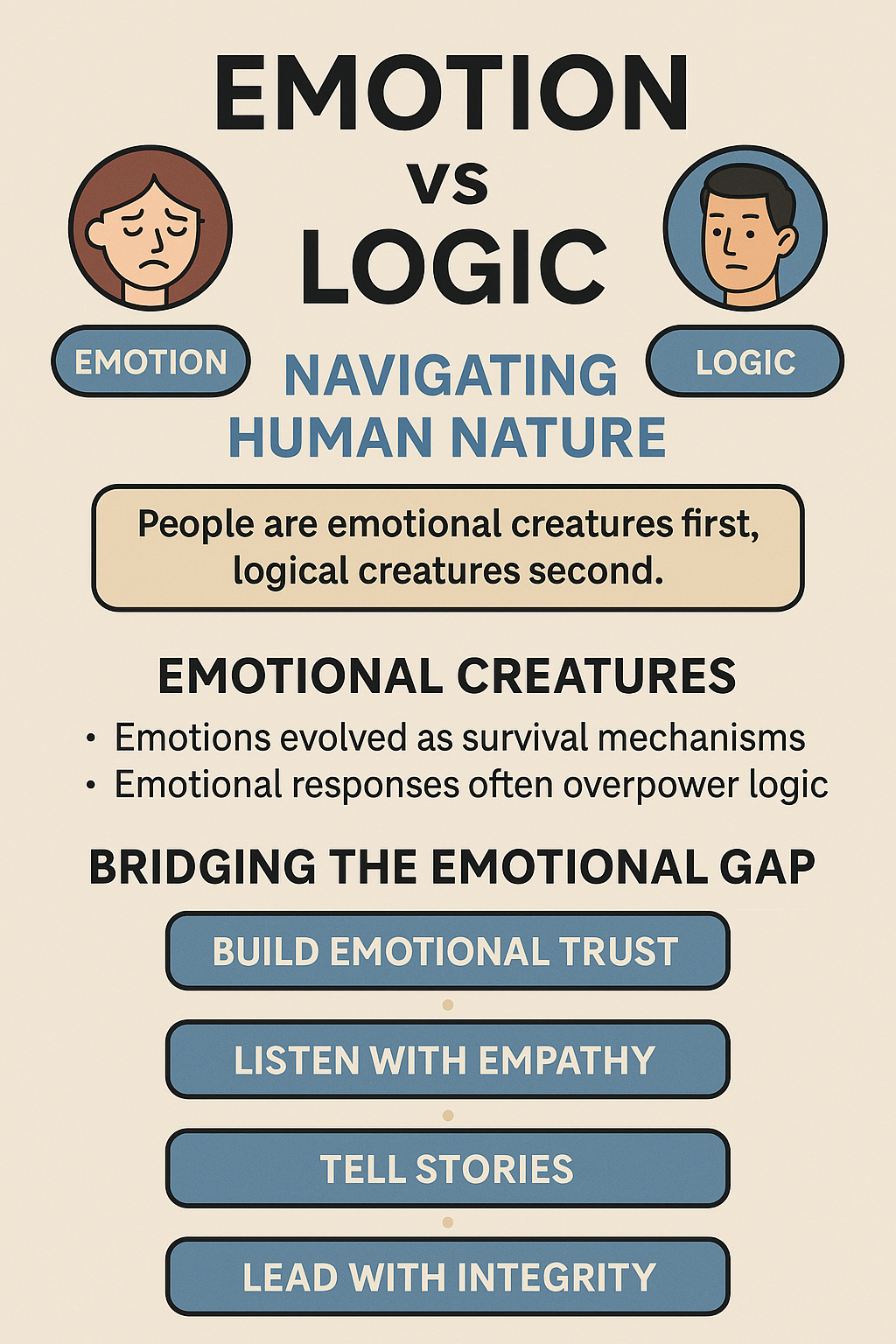Introduction: The Myth of the Rational Man
Dale Carnegie’s timeless insight —
“When dealing with people, let us remember we are not dealing with creatures of logic. We are dealing with creatures of emotion” —
cuts to the heart of why human communication, persuasion, leadership, and conflict are so complex.
It’s tempting to believe that reason rules our lives.
That societies, institutions, and individuals make decisions based on clear-headed, rational calculation.
But, as both ancient wisdom and modern psychology show, emotion is the true sovereign of human nature.
Understanding this truth is essential for:
- Building trust
- Resolving conflicts
- Leading effectively
- Bridging political and cultural divides
- Navigating personal relationships
And as we saw earlier with Mark Twain’s observation about lies traveling faster than truth, emotional manipulation plays a central role in how societies are shaped — for good or for ill.
The Primacy of Emotion in Human Nature
1. Evolutionary Foundations
Long before humans developed language, logic, or abstract reasoning, we evolved emotions like fear, anger, joy, and attachment as survival mechanisms.
- Fear kept us alive in dangerous environments.
- Love bonded us into communities and families.
- Anger protected our dignity and boundaries.
- Sadness invited others to help heal us.
Emotion came first; reason came later.
Even today, emotions dominate first reactions, and logic usually comes afterward to rationalize the emotional response.
“We feel first; we think second.”
2. Neurological Reality
Neuroscientific research confirms this:
- The amygdala (the emotional center) processes threats and rewards faster than the prefrontal cortex (the logical center).
- Emotional stimuli literally bypass logic in many cases, triggering fight-or-flight responses before reason can intervene.
Thus, expecting people to be logical in moments of stress, fear, tribal loyalty, or hope is biologically unrealistic without intentional emotional regulation and education.
The Consequences of Forgetting This Truth
1. Communication Failures
When we assume people “should just see reason,” we set ourselves up for frustration.
Facts and logic rarely change minds unless emotional trust and openness are first established.
People change because they feel safe, respected, and inspired — not because they lose an argument.
2. Political and Cultural Polarization
As we discussed earlier, politics today is emotional tribalism, not rational discourse.
- Appeals to fear, anger, pride, and resentment dominate campaigns and media.
- Rational discussion collapses when people feel existentially threatened by “the other side.”
If we do not address emotional realities, we cannot heal divisions.
3. Manipulation by Elites
Global oligarchs and corrupt elites — as Noam Chomsky warned — exploit emotional vulnerabilities through:
- Consumption (pleasure, status, envy)
- Fear (threats to safety and prosperity)
- Outrage (anger against scapegoats)
By keeping populations emotionally reactive, they prevent critical thinking and accelerate their own control.
Bridging the Emotional Gap: Practical Wisdom
If people are creatures of emotion first, how should we approach them wisely?
1. Build Emotional Trust Before Offering Logical Arguments
Before presenting facts, create an environment of respect, safety, and shared humanity.
“People don’t care how much you know until they know how much you care.” — often attributed to Theodore Roosevelt
2. Listen with Empathy, Not Argument
Listening is not waiting for your turn to talk.
Listening is understanding the emotional need behind what someone is saying.
When people feel heard, they are more willing to hear.
3. Tell Stories, Not Just Facts
Stories engage emotions, imagination, and empathy.
They break down defenses faster than logical syllogisms.
- Christ taught primarily through parables.
- The Founding Fathers used stories of oppression and liberty to unite the colonies.
- Great teachers weave narrative and fact together.
4. Lead With Moral Integrity
As we explored with Paul and Christ, truth is not just an intellectual concept — it is embodied in moral character.
Emotional creatures will follow those who demonstrate:
- Courage
- Compassion
- Justice
- Humility
- Sacrifice
5. Educate for Emotional Intelligence
Just as we must teach logic and ethics, we must teach emotional mastery:
- Self-awareness
- Emotional regulation
- Empathy
- Constructive dialogue
This should be part of a classical education revival, alongside philosophy, logic, rhetoric, and moral reasoning.
The Spiritual Dimension
Christ’s approach embodies this perfectly:
He met people where they were emotionally — in their wounds, fears, and hopes — and lifted them toward deeper truth.
- He wept with those who wept.
- He showed anger at injustice.
- He forgave those who failed Him.
- He called for purity of heart, not just correctness of mind.
Spiritual maturity is not emotional suppression; it is emotional transformation.
Thus, in bridging the emotional gap, we must become examples of the love, patience, and moral courage that draw emotional creatures back toward truth.
Conclusion: Honoring Both Emotion and Logic
Dale Carnegie reminds us:
- People are not spreadsheets.
- Arguments are not blueprints.
- Change is not mechanical.
To bridge the gap between lies and truth, between tyranny and liberty, between division and unity, we must recognize the emotional foundations of humanity.
And we must learn to lead with empathy and educate toward wisdom — the harmony of rightly-ordered emotion and rightly-guided reason.
In the end, civilization itself depends on this balance.





